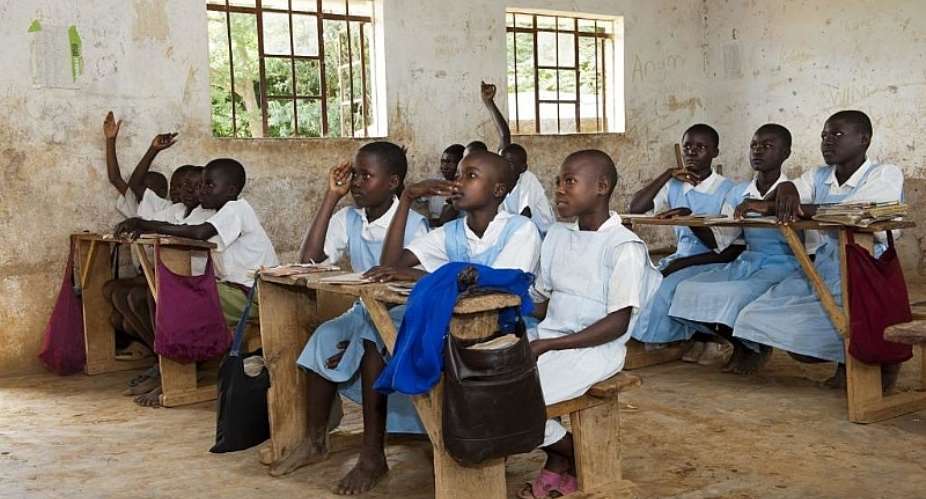Since Kenya went into coronavirus lockdown on 20 March, all schools and higher education establishments have been closed. Digital learning has been proposed as an alternative, but it does not help students living in rural areas, without electricity or internet access.
Maxwell Mwangalla is a second-year journalism student at the Technical University of Mombasa. He lives in the rural area of Taru, about 65 kilometres from Mombassa.
Revising for his end of term examination has not been easy, because he cannot access the internet from home.
Maxwell says the government directive has affected his learning as he is forced to spend extra money to visit a cyber cafe and download notes and assignments sent by his lecturers.
"It is very challenging. I cannot access my practicals. I know my fellow students are ahead of me. I heard we have exams coming soon and they will be sent online, so I am in a dilemma," he says.
Maxwell adds that digital learning presents a lot of challenges since the government has not established proper infrastructure in the education sector.
He says the majority of lecturers are not comfortable with the idea of digital learning as they serve many students at a time, and he is afraid he might not perform well in his final exams.
Good time for revising
Fadhili Mwambingu is a student at Mombasa Technical Training Institute. He has access to internet at his home. He says he has been using his time in confinement to do his online practicals.
Fadhili says the government directive is very helpful at this time when the world is battling the coronavirus pandemic, since he can avoid crowded classrooms.
"I am doing well with my digital learning for now. I know I will do better in my final exams, although we have a challenge, we cannot ask as many questions online compared to being in a classroom," says Fadhili.
Fadhili admits it is costly when there are service disruptions as he is forced to buy internet bundles.
He says this is a difficult moment for the education sector in the country, and fears many students might be forced to resit because of the disruption.
"I normally revise with my books when I don't have internet access, but my biggest worry are my fellow students who cannot access internet. How will they pass exams if they are going through these challenges? The government should do something," he adds.
Teachers' union supports government
According to Dan Aloo, the local chairman of the Kenya National Union of Teachers, the decision to shut down learning institutions comes with health benefits for students as it minimises spread of Covid-19.
But he says the government should abolish internet charges completely at this time of pandemic.
"We understand many families have smartphones at their homestead and, through the data we have in the government this directive is effective, many educational programs are broadcast on national TV and radio stations, this is very helpful," says Aloo.
But he believes the government should have provided guidance and counselling sessions to students.
Health first, education second
Faith Mwende is a parent in Kipevu area in Mombasa. She accepts that, despite some hurdles experienced in the education sector by some students, the government effort was meant to protect their health.
Faith adds that this directive has enabled students to respect social distancing rules.
"As parents, we should take this issue with great seriousness, as we focus on the education timetable we should also teach our kids how to adhere to the government's directives on hygiene and social distancing to reduce the spread of this deadly disease", she said.
Despite these difficulties, and the disruption of the school calendar, many students remain optimistic that they will pass their exams.





 Tuesday’s downpour destroys ceiling of Circuit Court '8' in Accra
Tuesday’s downpour destroys ceiling of Circuit Court '8' in Accra
 SOEs shouldn't compromise on ethical standards, accountability – Akufo-Addo
SOEs shouldn't compromise on ethical standards, accountability – Akufo-Addo
 Father of 2-year-old boy attacked by dog appeals for financial support
Father of 2-year-old boy attacked by dog appeals for financial support
 Jubilee House National Security Operative allegedly swindles businessman over sa...
Jubilee House National Security Operative allegedly swindles businessman over sa...
 Nobody can order dumsor timetable except Energy Minister – Osafo-Maafo
Nobody can order dumsor timetable except Energy Minister – Osafo-Maafo
 Mahama wishes National Chief Imam as he clock 105 years today
Mahama wishes National Chief Imam as he clock 105 years today
 J.B.Danquah Adu’s murder trial: Case adjourned to April 29
J.B.Danquah Adu’s murder trial: Case adjourned to April 29
 High Court issues arrest warrant for former MASLOC Boss
High Court issues arrest warrant for former MASLOC Boss
 Align academic curriculum with industry needs — Stanbic Bank Ghana CEO advocates
Align academic curriculum with industry needs — Stanbic Bank Ghana CEO advocates
 Election 2024: We'll declare the results and let Ghanaians know we've won - Manh...
Election 2024: We'll declare the results and let Ghanaians know we've won - Manh...
